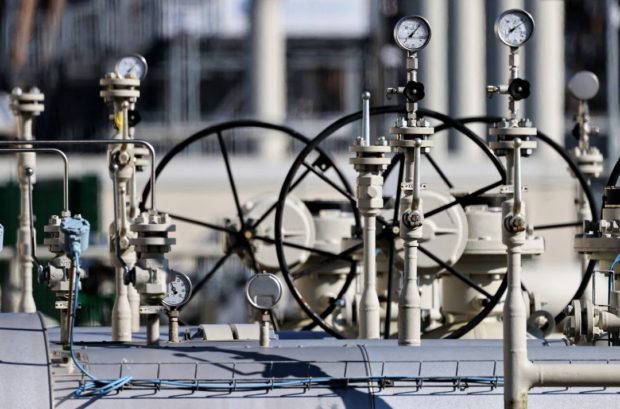
Pipes at the landfall facilities of the ‘Nord Stream 1’ gas pipeline are pictured in Lubmin, Germany, March 8, 2022. REUTERS FILE PHOTO
BERLIN/COPENHAGEN — Germany faces certain recession if faltering Russian gas supplies stop completely, an industry body warned on Tuesday, and Italy said it would consider offering financial backing to help companies refill gas storage to avoid a deeper crisis in winter.
European Union states from the Baltic Sea in the north to the Adriatic in the south have outlined measures to cope with a supply crisis after Russia’s invasion of Ukraine put energy at the heart of an economic battle between Moscow and the West.
The EU relied on Russia for as much as 40% of its gas needs before the war – rising to 55% for Germany – leaving a huge gap to fill in an already tight global gas market. Some countries have responded by temporarily reversing plans to shut coal power plants.
Gas prices have hit record levels, driving a surge in inflation and adding to challenges for policymakers trying to haul Europe back from an economic precipice.
Germany’s BDI industry association on Tuesday cut its economic growth forecast for 2022 to 1.5% from the 3.5% expected before the war began on Feb. 24. It said a halt in Russian gas deliveries would make recession in Europe’s largest economy inevitable.
Russian gas is still being pumped via Ukraine but at a reduced rate. The Nord Stream 1 pipeline under the Baltic, a vital supply route to Germany, is working at just 40% capacity. Moscow says Western sanctions are hindering repairs; Europe says this is a pretext to reduce flows.
German Economy Minister Robert Habeck said the reduced supplies amounted to an economic attack and part of Russian President Vladimir Putin’s plan to stir up fear.
“This is a new dimension,” Habeck said. “This strategy cannot be allowed to succeed.”
The slowdown has hampered Europe’s efforts to refill storage facilities, now about 55% full, to meet an EU-wide target of 80% by October and 90% by November, a level that would help see the bloc through winter if supplies were disrupted further.
On Tuesday, Italy’s government announced initial measures to boost gas storage after energy company Eni reported a shortfall in flows from Russia for more than a week. read more
Ecological Transition Minister Roberto Cingolani said in a statement the government planned to purchase coal if it needed to use coal-fired power plants to save gas. Cingolani also asked gas grid operator Snam to adopt measures to help bring gas stockpiles to around their targeted level for June.
The benchmark gas price for Europe was trading around 126 euros ($133) per megawatt hour (MWh), below this year’s peak of 335 euros but up more than 300% from a year ago.
‘We have a problem’
Countries other than Italy, including Austria, Denmark, Germany and the Netherlands, have activated the first early warning stage of a three-stage plan to cope with a gas supply crisis.
Germany’s Bundesnetzagentur gas regulator outlined details of a new auction system to start in coming weeks, aimed at encouraging manufacturers to consume less gas.
The head of the Bundesnetzagentur questioned whether current gas deliveries would get the country through the winter. Earlier, he said it was too soon to declare an all-out emergency, or the third stage of the crisis plan.
“As it stands today, we have a problem,” Bundesnetzagentur President Klaus Mueller said on the sidelines of an industry event.
The CEO of Germany’s largest power utility RWE Markus Krebber said Europe had little time to plan.
“How would we re-distribute the gas if we were fully cut off? There is currently no plan … at European level … as every country is looking at their emergency plan,” he told the same event.
Soaring European prices have attracted more liquefied natural gas (LNG) cargoes, but Europe lacks the infrastructure to meet all its needs from LNG, a market that was stretched even before the Ukraine war.
Disruptions to a major U.S. LNG producer added to the challenge.
Europe is seeking more pipeline supplies from its own producers, such as Norway, and other states, including Azerbaijan, but most producers are already pushing the limits of output.
Even small consumer Sweden has joined European allies in triggering the first stage of its energy crisis plan.
The state energy agency said supplies remained robust but it was signalling “to industry players and gas consumers connected to the western Swedish gas network, that the gas market is strained and a deteriorating gas supply situation may arise”.
Sweden, where gas accounted for 3% of energy consumption in 2020, depends on piped gas supplies from Denmark, where storage facilities are now 75% full. Denmark activated the first stage of its emergency plan on Monday.
($1 = 0.9477 euros)
RELATED STORIES
Lithuanians near Kaliningrad put faith in Nato after Russia’s threats
Checkpoints, disappearances, interrogations: life in occupied Kherson
Turkish team to discuss Black Sea grain corridor in Russia this week—sources
Estonia protests to Russia over airspace violation as Baltic tensions rise